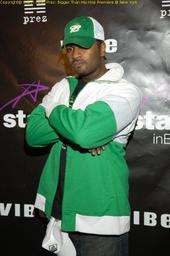John Threat
John Lee, a.k.a. John Threat, used the name "Corrupt" as a member of Masters of Deception (MOD), a New York based hacker group in the early '90s.

As a result of his participation in the Great Hacker War, between MOD and rival hacker group Legion of Doom, he was indicted on federal wiretapping charges in 1992. He pled guilty and was sentenced to one year at a federal detention center. His participation in the Great Hacker War landed him on the cover of Wired Magazine in 1994.
Lee was born on July 6, 1973 in Brooklyn, New York. He grew up in Brownsville, where he was a member of the Decepticons, a Brooklyn-based street gang formed in the early '80s, named after the villains in the Saturday morning cartoon, Transformers. Lee attended Stuyvesant High School[1] and went on to New York University. During his freshman year at NYU, Lee was sentenced to prison for his role in the Great Hacker War.
Lee also has editing, producing, and directing credits in film and television. In 2004 he founded Mediathreat, LLC, a film production company. In 2005, he directed the original documentary "Dead Prez: Bigger than Hip Hop." In 2011, he co-directed the music video for MAKE OUT's single "You Can't Be Friends With Everyone" with Diane Martel.
Lee also gained notoriety in 2001 when he revealed himself as the anonymous editor of UrbanExpose.com, a controversial entertainment gossip website.
Media
- Village Voice, "Rebel Hackers: The Computer Kids who Phreak Out the Feds," By Julian Dibbell, July 24, 1990
- Wired, "Gang Wars in Cyberspace," By Michelle Slatella and Joshua Quittner, December 1994
- The Industry Standard, "An Urban Mystery Man Revealed," By Kenneth Li, February 12, 2001
- Inside Magazine, "Confession of a Media Terrorist," By John Lee, March 6, 2001
- Shift Magazine, "Being John Lee," By Christopher Shulgan, 2002
- Mass Appeal, "A Digital Gangsta," By Noah Rubin and Todd Jordan, 2004
References
- Slatalla, Michele; Quittner, Joshua (1995). Masters of deception: The gang that ruled cyberspace. New York: HarperCollins Publishers. ISBN 0-06-092694-5.